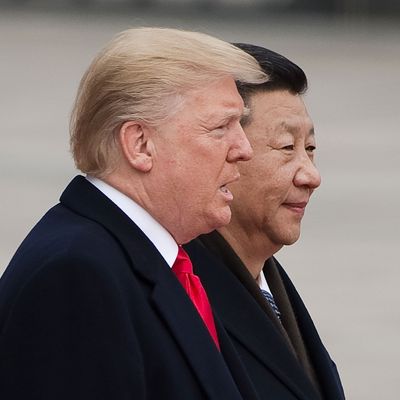
On Tuesday, Donald Trump unveiled a list of Chinese imports that he plans to slap tariffs on. Less than 24 hours later, Beijing returned serve, naming 106 U.S. exports that it intends to render unaffordable to Chinese consumers via the imposition of 25 percent duties — the second that Trump follows through on his tariffs threat.
That sound you hear is the world’s two largest economies marching toward trade war — and the markets are recoiling at the noise. The Dow fell more than 400 points in early trading, while stock futures tumbled.
And investors are far from the only Americans flirting with a panic attack this morning. Workers and business owners in our nation’s agricultural sector — which is to say, a considerable number of Trump voters — must now worry about their industry’s near-term future, as the threat of steep tariffs on American pork products, ethanol, soybeans, fruits, nuts, and wine all loom.
And so, the president decided to reassure the anxious nation — by reiterating his belief that America has little to lose by waging a prolonged trade war against China.
There is a scintilla of truth to these ravings: Generally speaking, trade wars are more devastating to countries with trade surpluses than those with a trade deficits. But this does not mean that America “can’t lose” a trade war with China; unless one considers an outcome that produces higher unemployment and slower growth in the U.S. — but even worse economic conditions in China — to be victory.
Still, there’s some cause for cautious optimism. The biggest obstacle to Trump following through on his most ill-advised protectionist instincts was never Gary Cohn, but rather, his desire to see green arrows on cable news. The president has told advisers that he sees the stock market as a form of polling — and we all know how desperately our commander-in-chief longs for validating poll numbers.
Trump’s morning tweets might signal confidence on the surface, but their subtext is unease. Just a few weeks ago, the president was quite comfortable describing his tariffs as an act of “trade war”; now, he feels compelled to disavow that term, while tweeting rebuttals to the disconcerting financial news on his television screen.
For the moment, the tariffs announced by both sides are mere threats, not realities. And, as economist Jared Bernstein notes, Trump has plenty of time to find a diplomatic alternative to trade war.
At this point, the rational move for Trump would be to seek a means of simultaneously saving face and the bull market that he inherited. And is there any reason to fear that our president will take anything but the most rational course?






























